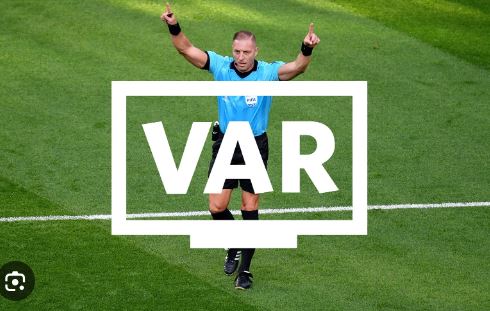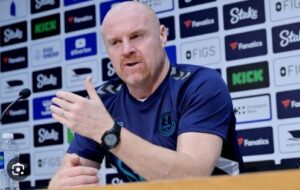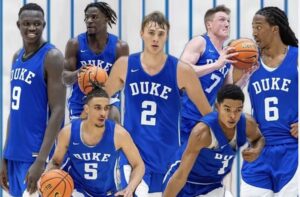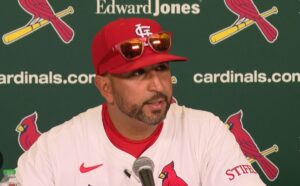
Everton began April without a league victory in 2024. They conclude it safely. Everton correspondent Joe Thomas tries to pinpoint when this season turned around.
As St James’ Park erupted in excitement, Sean Dyche moved into the away dugout and turned his back on the action. It was only a few seconds before he returned to the pitch, and few, if any, will know what was going through his thoughts during what must have been a difficult time.
Dan Burn’s celebration of his own supporters was cut short by the announcement of a VAR check. Dyche made a triple substitution, possibly as a gamble, after Everton fell behind 2-0 at Newcastle United.
Then everything changed. VAR, Everton’s frequent adversary, judged Alexander Isak had stepped offside when he ran to meet the quickly taken free-kick, which he then crossed for Burn. Okay, almost everything. Despite being granted a reprieve, Dyche remained steadfast in his changes. And they transformed the game.
Everton have endured a long, difficult season. Genuine development on the pitch has been hampered not only by point deductions and a leadership vacuum off it, but also by spells of poor form from a frail squad that has been pushed to its limits. The struggle is now finished, following a week in which Goodison and the Royal Blues dominated Nottingham Forest, Brentford, and, most impressively, Liverpool.
Everton went from facing a third consecutive survival fight to the death in six days to preparing for the club’s first pressure-free Premier League games in over three years, and probably the first under Dyche. The fact that this came after such a humiliating defeat at Chelsea makes the comeback even more impressive.
Identifying a turning moment for a team that began the month without a league win this calendar year and finishes 11 points clear of trouble is an imperfect experiment. However, the minutes in which Dyche took a rare gamble from the bench, prompted by a goal that did not stand, are a legitimate candidate.
Newcastle had dominated Everton for an hour before to that disallowed goal. The away team were bedraggled, and a second goal was likely, with Jordan Pickford’s heroics against his harshest critics the only thing keeping the game in play. When Burn’s back post attempt was ruled out, the mood altered. A crowd expecting another goal began to wonder if this might be their day. Everton fans, limited to the heavens of the North East, dominated the music for the final half-hour, with Andre Gomes, Dominic Calvert-Lewin, and James Garner swinging the balance of play in Everton’s favour.
/cdn.vox-cdn.com/uploads/chorus_image/image/72939549/1252255144.0.jpg)
Ashley Young’s last-minute penalty was warranted. Calvert-Lewin scored after going months and nearly two dozen games without a goal. Everton’s losing streak had stretched to 13 games, a club Premier League record, but the style of the comeback provided hope. Dyche was upbeat during the post-match interviews as a result. He stated: “Before the game, I showed them some clips of us winning games easily, keeping clean sheets, scoring goals, and no one was questioning anything. And then you go on that run, it sneaks up on you, you don’t win, and the cacophony changes. I replied it wasn’t that long ago that we were playing like we did in that second half, with that edge, you can smell it.
“When you watch a team playing like way, you just have the feeling that they are handy and will score a goal or whatever. I sensed that in the second half, and I believe everyone else did as well, which was pleasing for the entire squad. We made some tweaks for the sake of freshness. We have people working very hard despite the run, which is obviously awkward, but they are still working very hard, and we expect a lot of them, so I was glad for them.”
Dyche’s side began that terrible 13-game stretch with a heroic, unlucky defeat at Tottenham Hotspur, but as winter turned to spring, they began to find new ways to waste points, failing to hold on against 10-man Brighton and Hove Albion and conspiring to the most ridiculous of stoppage-time defeats against West Ham United and Bournemouth.
The point at Newcastle gave Everton something to build on, and four days later, they went one step further against Burnley in what had become their season’s biggest game. The victory was narrow, unimpressive, and, as Dyche subsequently admitted, “ugly by design”. However, the three points broke the winless streak, provided a boost in the relegation race, and dealt a major blow to a team attempting to catch them.
Everton’s winning streak was short-lived, as they were humiliated the next week at Chelsea. Four of the six goals scored that night came in a terrible first half. At the final whistle, James Tarkowski said he was “embarrassed” by his performance, while Dyche questioned the players’ departure from his tactics. The following days at Finch Farm were chastening, with Dyche telling the players he was not going anywhere if they expected him to walk. His efforts to rally support included introspection and reflection on his own work.
“Every aspect has to be better because it was miles off,” he continued, “miles off my own expectations of me, my planning and preparation, and ensuring the team is in the right place. The responsibility does fall on me, but I believe we have been working to develop a squad mentality in which everyone plays their part, and that was a big reminder the other night, certainly to myself, that there are no shortcuts, no easy way out of any of this; you have to win games, you have to be mentally, physically, tactically, and technically prepared to go and deliver, and we clearly fell short.”
His demeanour in his pre-Nottingham Forest media obligations suggested that the Chelsea aftermath had been difficult, and his decision to remove his suit in favor of a tracksuit indicated that a guy who requires all focus be on ‘managing the controllable’ was looking for any opportunity for a change of fortune.
That went against Forest. Everton supporters rallied in a tight game with both sides under intense pressure, and their team almost replied. It took two long-range tries, three questionable penalty calls, a fantastic Pickford save from Chris Wood, and Morgan Gibbs-White to squander a golden opportunity to equalize. But Everton won, which changed momentum at the bottom.
That victory relieved a lot of the pressure, which was entirely alleviated by the Merseyside Derby victory. Everton built on their previous excellent result to present an intense and aggressive effort that Liverpool could not handle. Pickford needed to be on top form, but Everton were far superior as Calvert-Lewin and Jarrad Branthwaite secured a historic victory, allowing Dyche to become the first manager to defeat Liverpool at Goodison Park since 2010. The uncertainty was lifted with the win over Brentford on Saturday, and Dyche was upbeat following the game. A week before, he led his squad out against Forest, unsure how they would respond to the collapse in west London. The job was completed six days later the job was done.
That Chelsea defeat posed a significant challenge for Dyche and his coaching staff, but the results that saved Everton were built on the final 30 minutes against Newcastle. If the Blues had fallen down 2-0, they might not have had a chance to rally a struggling side. Those final stages established the groundwork for the resurrection. Calvert-Lewin ended his drought in the north east by scoring the winner against Burnley and the important second goal against Liverpool. Pickford replied to the last-minute horror show at Bournemouth with a man-of-the-match performance in his most difficult situation.Aside from Chelsea, Wood’s save against Forest, as well as stops by Darwin Nunez, Luis Diaz, and Mo Salah, were critical to the win. Chelsea may have been Everton’s rock bottom. However, the groundwork for the week that changed everything began with the goal that never happened at Newcastle.







